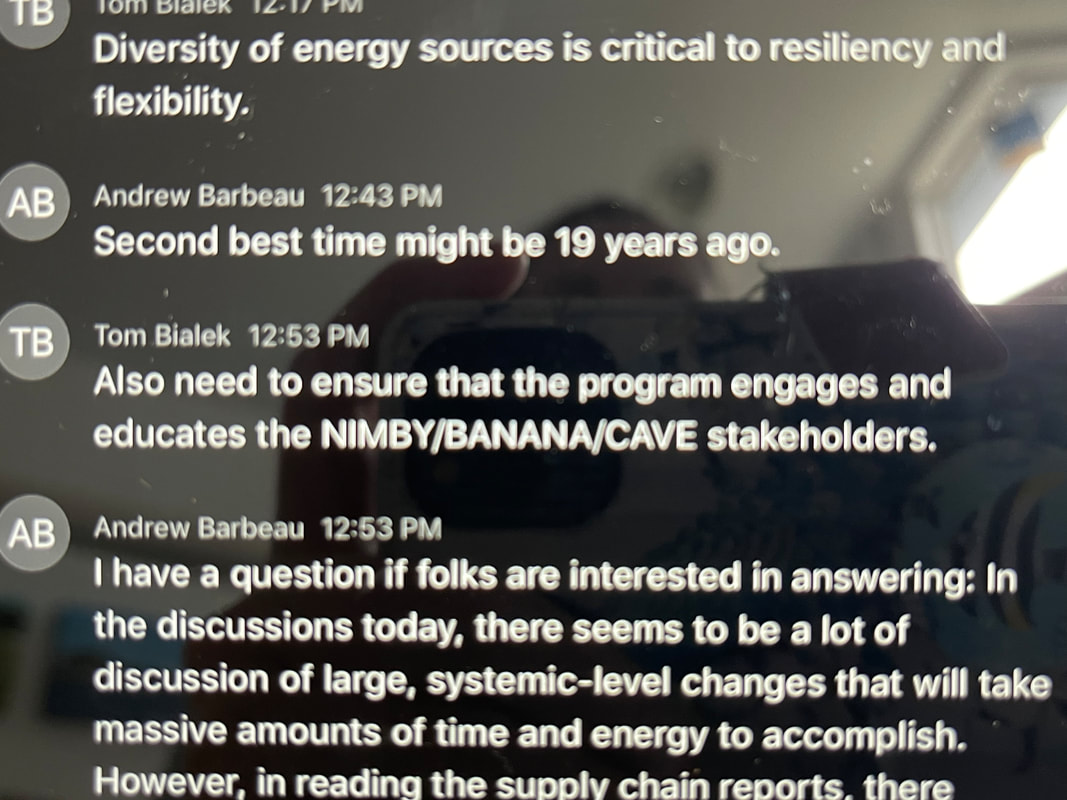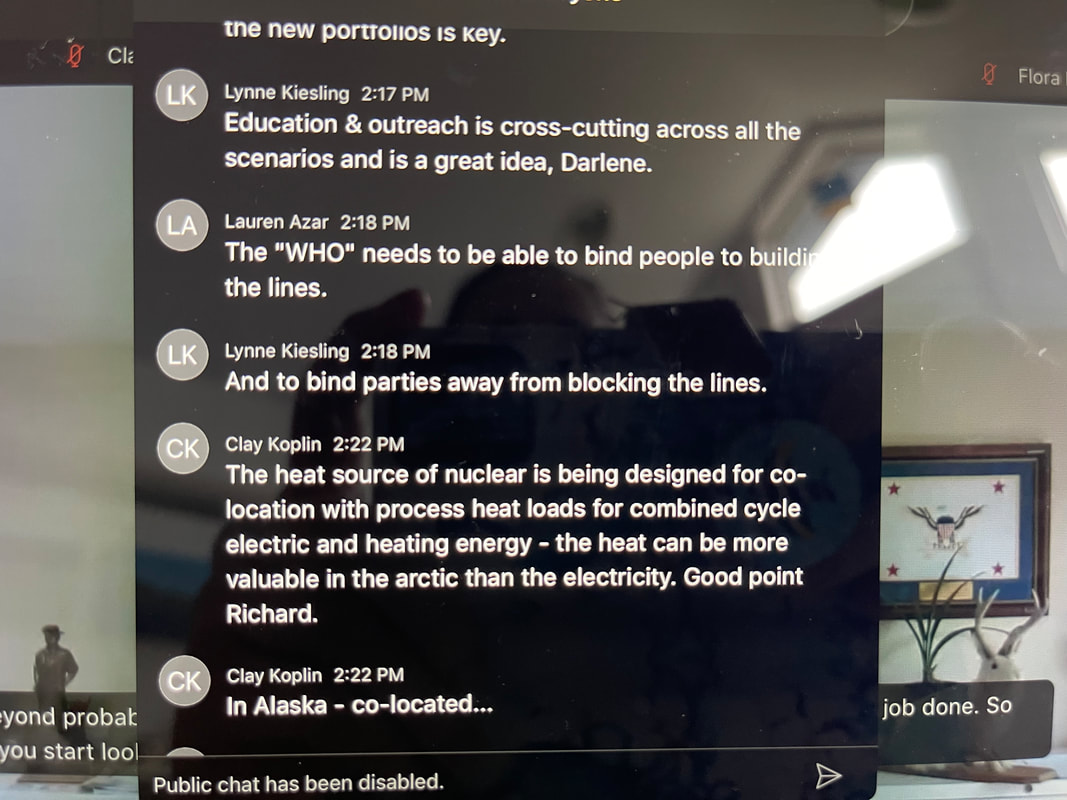Our government is great at "transparency" and getting better all the time. The only thing is that they are also getting better at letting the industry control the policy and allowing people who stand to personally gain from the policy to create it. Combining transparency with pay to play is an eye opening experience.
Also eye opening is the way the industry disparages ordinary folks when they think you're not listening. When a citizen who has patiently listened to industry and government political ring kissing and flowery business buzzwords and unicorn stories about energy for 10 hours is finally allowed a mere 3 minutes to make comment, it's like somebody suddenly crapped in the punch bowl.
Anyhow, the EAC has been around for years, but it normally meets in person and no ordinary citizen wants to fly to DC to listen in. But COVID has helped expose what's actually going on by taking these meetings virtual, as it's done for many other previously opaque processes.
During this meeting, several participants expressed concern that they wouldn't be able to get any big, new transmission done and should instead concentrate on using existing rights of way to increase power transfers. That's all fine and good. Most landowners don't get tweaked about upgrading existing infrastructure. But what foments costly and time consuming opposition is new transmission on new rights of way across private property, especially farmland where the owner's income is dependent upon the use of his land. You wouldn't take away a carpenter's toolbox and tell him he'll make just as much money without it, would you? Then why tell a farmer that taking away the land where he grows food, and placing dangerous impediments across it, doesn't affect his business? Burying new transmission on existing rail and road rights of way is the sensible solution to building new transmission without the drag of costly opposition. There's actually a fully-formed business plan to install the first of these revolutionary new projects, and it has not been met with stiff opposition.
Also, there was some talk about the Infrastructure Investment and Jobs Act provision for allowing the DOE to become a paying "anchor tenant" on speculative merchant transmission projects.
And, finally, the arrogant elite committee clique's disdain for ordinary folks was put on full display by several committee members. One commented:
Also need to ensure that this program engages and educates the NIMBY/BANANA/CAVE stakeholders.
Education & outreach is cross-cutting across all the scenarios and is a great idea.
The "WHO" needs to be able to bind people to building the lines.
And to bind parties away from blocking the lines.
They got pretty into bashing grassroots opposition to new transmission, oblivious to the public presence watching them prance and dance in a good ol' back slapping shindig that can only be made merrier by disparaging other people not present. Just remember, this is your government at work!
Perhaps they simply didn't notice that the DOE had reserved the last 20 minutes of the webinar for "public comment." Or maybe they didn't think any public would comment on their disgusting behavior?
Whoopsie!
Public Comment from Keryn Newman:
I do not see anyone on the EAC that is representing the interests of the communities and landowners who will be affected by new transmission and electric infrastructure. During yesterday’s webinar, I noted that several speakers expressed concern that new transmission could not be built in a timely fashion due to siting and permitting issues. Community and landowner opposition is perhaps the largest impediment to getting new infrastructure built in a timely fashion. I urge DOE and/or this committee to consider that burial of new transmission on existing rail or road rights of way may be an appropriate path forward. Building new transmission that does not take new land, or visit lasting visual impacts upon host communities, does not foment community and landowner opposition. Without opposition, siting and permitting can happen much faster. It’s the sensible solution.
Public Comment from Martha Peine (that's pronounced "pine-e", not "peen", BTW):
Communities and landowners affected by new transmission and electric infrastructure are not represented on the EAC. It may be that when the committee was formed, no one considered affected communities and landowners would have the expertise required to help guide the DOE’s involvement in transmission planning. However, many do become true experts on issues of necessity and environmental impacts when their way of life is threatened. That opposition is then successful because the evidence is on their side.
I believe the burial of new transmission on existing rights of way would meet with less resistance provided it is necessary. The IIJA provision that allows, and the committee’s consideration of, making the DOE an anchor tenant on merchant projects does raise a red flag as to necessity. Are these merchant projects roads to nowhere built to deliver electricity that no one wants? This could end up being a bill taxpayers get stuck with for up to 40 years in exchange for nothing.
Again, the burial of new transmission on existing rights of way will meet with less resistance provided it is truly necessary. Siting and permitting could then happen much faster.
Comment of Mary Mauch:
I would like to address the following comment Tom Bialek made in the chat comments of today's session. Tom wrote:
"Also need to ensure that the program engages and educates the NIMBY/BANANA/CAVE stakeholders."
Does this disparaging of concerned and educated taxpayer/ratepayer stakeholders reflect this committee's attitude? Who is really responsible for creating "equity" in this "deploy, deploy, deploy" energy transition? Respecting, including, and listening to the voices of educated citizen stakeholders might actually yield far better results than disrespecting and marginalizing them. After all, they're most likely the ones living in the "remote" industrial wind/solar plants and being forced to "host" private, speculative transmission lines and have researched and observed some of the TRUE costs to "remote" communities, non-renewable prime farmland, and the "remote" wildlife and environment.
"Equity must be at the forefront of energy transition across all domains."
An uncomfortable moment of silence ensued before Kimberly from the American Gas Association stepped up to make excuses against burial of electric transmission. She claimed to know "these people". Sorry, sweetcheeks, you don't know us. Not AT ALL. If you meant to imply that we've also opposed gas pipelines, you're totally wrong. If you meant it in a "these NIMBYs are all alike" fashion, you'd still be wrong. People like Kimberly have NO IDEA what motivates us, how we operate, and how we develop our strategies. Then Kimberly said that third party contractors dig up gas pipelines all the time rather than call 811 and therefore buried electric cables would be carelessly cut by contractors resulting in power outages so we shouldn't bury them. Well, I have to give Kimberly a "C" for creativity. I haven't actually heard that excuse before. But it IS an excuse and nothing more. If that's your argument, Kimberly, then why aren't gas pipelines run overhead to avoid random digging? And why don't we hear about more tragedies involving contractors punching holes in gas pipelines? Or contractors in cities electrocuting themselves digging into existing buried lines? Maybe that's because it's made up bull-oney?
Someone called for more public comments, sort of the way you cool off soup by adding ice cubes to your bowl, but there were none to be had. Uncomfortable silence ensued while they all admired...
DOE is preparing its new Transmission Study. In the study DOE will identify new transmission corridors where it may use its new authority to override state permitting. Essentially, it's a free-for-all for transmission developers to pick where they want to build stuff and have their every wish granted. Is it going to be in YOUR back yard? Find out by attending the webinar. DOE says,
"In partnership with the Pacific Northwest National Laboratory and the National Renewable Energy Laboratory, DOE will collaborate with industry stakeholders, communities, and regional and local governments to help identify pathways for necessary large-scale transmission system buildouts that meet regional and national interests."
This new "whole of government" thing... does that really mean that everything is now being decided exclusively by the government and its chosen elite oligarchs? Are you only invited to "participate" so you can be belittled, marginalized and insulted?
Our government should be ashamed of itself. Well, if it still wants to pretend to be a democracy...



 RSS Feed
RSS Feed